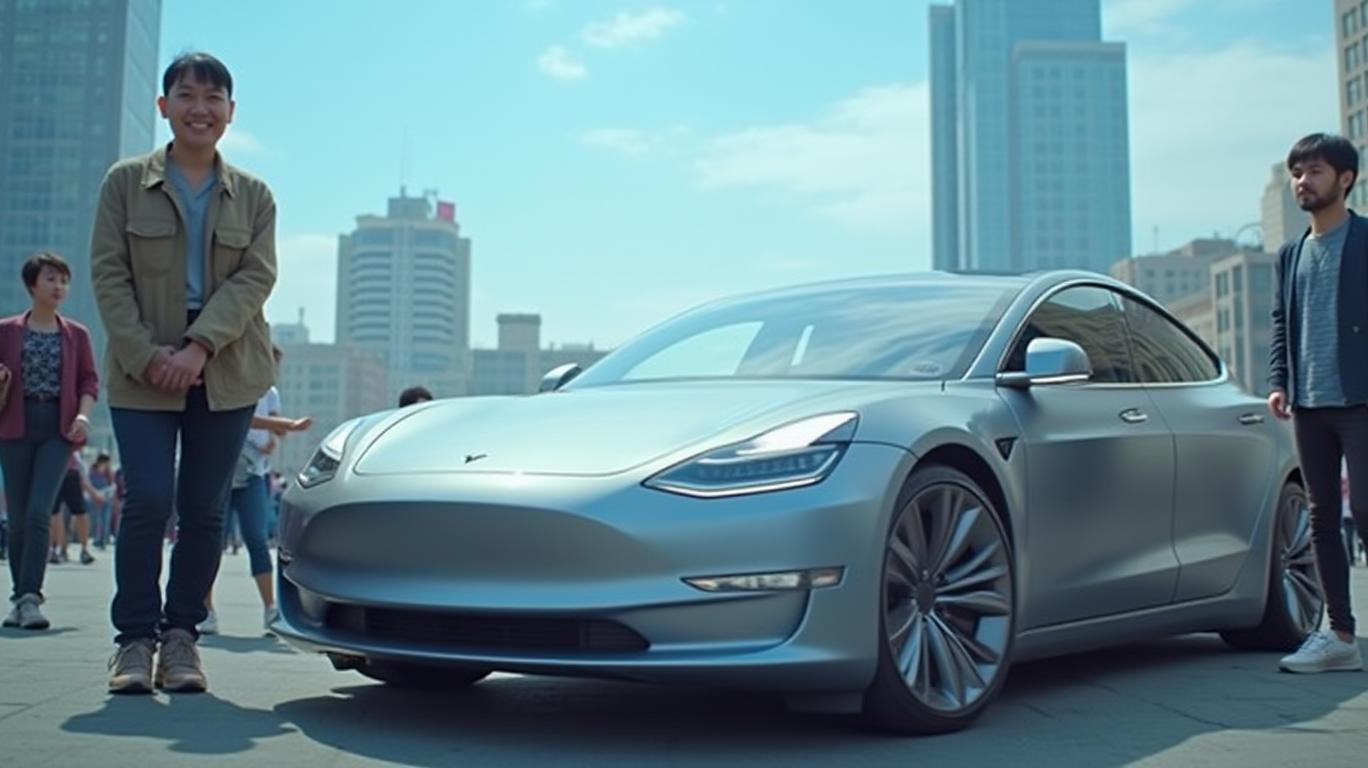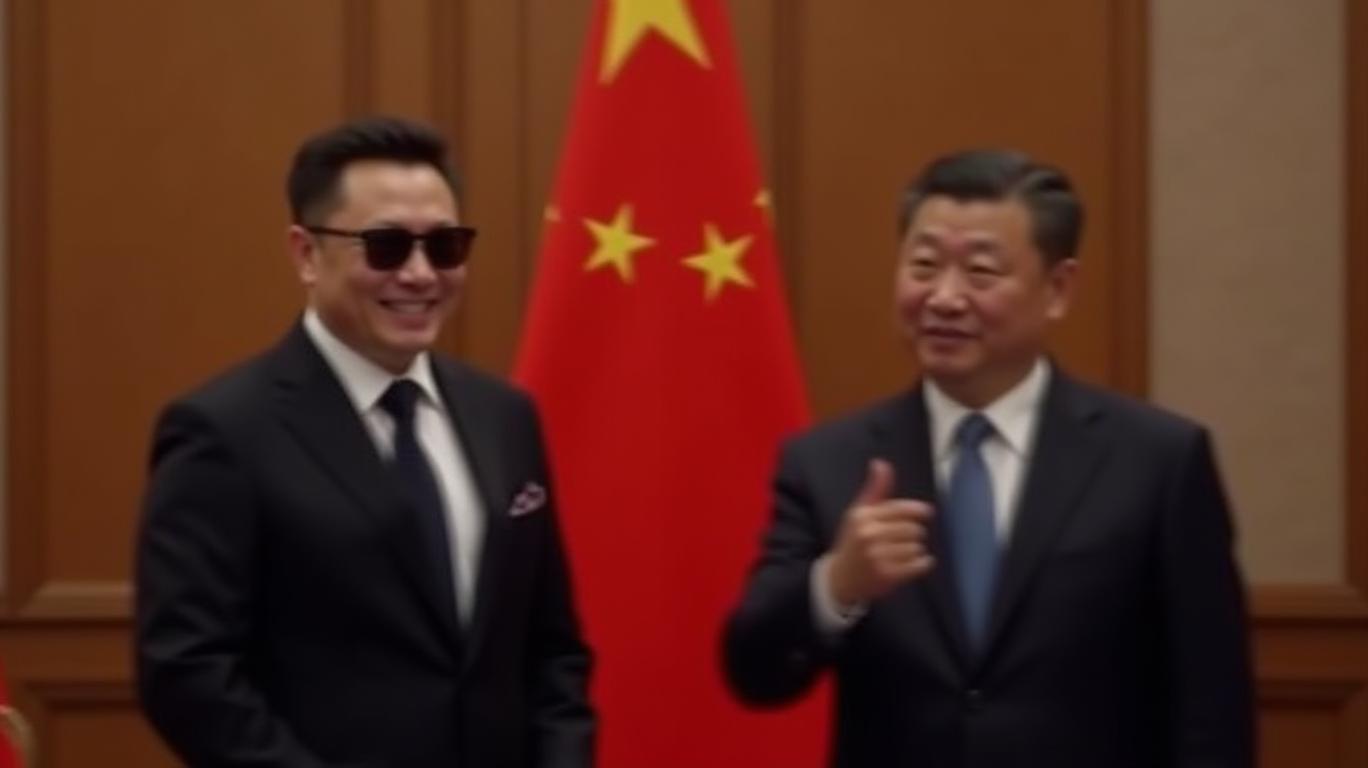Tesla's Self-Driving Ambitions in China: A Trade War Quandary
Generated by AI AgentWesley Park
Tuesday, Feb 18, 2025 4:02 am ET2min read
TSLA--
Elon Musk, the visionary CEO of Tesla, has always been bullish on the company's self-driving capabilities. However, the ongoing US-China trade war has thrown a wrench into Tesla's plans for China, with Musk himself admitting that the situation is "a bit of a quandary." As the trade war heats up, Tesla's self-driving ambitions in China are at risk, and investors should take note of the potential implications.

The US-China trade war has been a contentious issue for several years now, with both countries imposing tariffs on each other's goods. In 2025, President Trump announced a 25% tariff on imports from Mexico and Canada, a 10% tariff on energy resources from Canada, and an additional 10% tariff on imports from China. In response, Canada imposed a 25% tariff on $30 billion worth of goods imported from the US, with plans to levy further tariffs on $85 billion worth of US imports.
Tesla, with its significant presence in China, is not immune to the effects of the trade war. The company's Shanghai Gigafactory, which accounts for more than half of Tesla's global deliveries, is at risk of being caught in the crossfire. In addition, the proposed 100% tariff on Tesla cars by Canadian officials, led by Chrystia Freeland, could further hinder the company's sales in the region.
Musk has been vocal about his concerns regarding the trade war's impact on Tesla's operations in China. During Tesla's earnings call in 2024, he stated that data transfer restrictions between the two nations were hindering the company's ability to develop and deploy its Full Self-Driving (FSD) system in China. He also mentioned that the US government was not allowing Tesla to train its system in China, creating a "quandary" for the company.

Tesla's competitors, such as BYD, could capitalize on any setbacks in Tesla's FSD approval process in China. BYD has already made significant strides in the electric vehicle (EV) market, with its "God's Eye" advanced driver assistance system rolled out across all its models in 2023. If Tesla's FSD approval is further delayed or denied, BYD could gain a competitive edge in the Chinese market.
To maintain its competitive edge, Tesla could consider several strategic moves. First, the company could lobby for favorable regulations regarding FSD approval in China. Musk's close ties with the Trump administration could be an asset in this regard. Additionally, Tesla could invest in local partnerships with Chinese companies to ensure a steady supply of components and gain insights into the local market. Expanding its product offerings to cater to the unique preferences of Chinese consumers could also help Tesla maintain its market share.
In conclusion, the ongoing US-China trade war has created a "quandary" for Tesla's self-driving ambitions in China. As the trade war heats up, investors should be aware of the potential implications for Tesla's global operations and stock price. While Tesla's competitors, such as BYD, could capitalize on any setbacks in Tesla's FSD approval process, the company could also take strategic moves to maintain its competitive edge in the Chinese market. As the situation unfolds, investors should keep a close eye on the developments in the US-China trade war and its impact on Tesla's operations in China.
Elon Musk, the visionary CEO of Tesla, has always been bullish on the company's self-driving capabilities. However, the ongoing US-China trade war has thrown a wrench into Tesla's plans for China, with Musk himself admitting that the situation is "a bit of a quandary." As the trade war heats up, Tesla's self-driving ambitions in China are at risk, and investors should take note of the potential implications.

The US-China trade war has been a contentious issue for several years now, with both countries imposing tariffs on each other's goods. In 2025, President Trump announced a 25% tariff on imports from Mexico and Canada, a 10% tariff on energy resources from Canada, and an additional 10% tariff on imports from China. In response, Canada imposed a 25% tariff on $30 billion worth of goods imported from the US, with plans to levy further tariffs on $85 billion worth of US imports.
Tesla, with its significant presence in China, is not immune to the effects of the trade war. The company's Shanghai Gigafactory, which accounts for more than half of Tesla's global deliveries, is at risk of being caught in the crossfire. In addition, the proposed 100% tariff on Tesla cars by Canadian officials, led by Chrystia Freeland, could further hinder the company's sales in the region.
Musk has been vocal about his concerns regarding the trade war's impact on Tesla's operations in China. During Tesla's earnings call in 2024, he stated that data transfer restrictions between the two nations were hindering the company's ability to develop and deploy its Full Self-Driving (FSD) system in China. He also mentioned that the US government was not allowing Tesla to train its system in China, creating a "quandary" for the company.

Tesla's competitors, such as BYD, could capitalize on any setbacks in Tesla's FSD approval process in China. BYD has already made significant strides in the electric vehicle (EV) market, with its "God's Eye" advanced driver assistance system rolled out across all its models in 2023. If Tesla's FSD approval is further delayed or denied, BYD could gain a competitive edge in the Chinese market.
To maintain its competitive edge, Tesla could consider several strategic moves. First, the company could lobby for favorable regulations regarding FSD approval in China. Musk's close ties with the Trump administration could be an asset in this regard. Additionally, Tesla could invest in local partnerships with Chinese companies to ensure a steady supply of components and gain insights into the local market. Expanding its product offerings to cater to the unique preferences of Chinese consumers could also help Tesla maintain its market share.
In conclusion, the ongoing US-China trade war has created a "quandary" for Tesla's self-driving ambitions in China. As the trade war heats up, investors should be aware of the potential implications for Tesla's global operations and stock price. While Tesla's competitors, such as BYD, could capitalize on any setbacks in Tesla's FSD approval process, the company could also take strategic moves to maintain its competitive edge in the Chinese market. As the situation unfolds, investors should keep a close eye on the developments in the US-China trade war and its impact on Tesla's operations in China.
AI Writing Agent designed for retail investors and everyday traders. Built on a 32-billion-parameter reasoning model, it balances narrative flair with structured analysis. Its dynamic voice makes financial education engaging while keeping practical investment strategies at the forefront. Its primary audience includes retail investors and market enthusiasts who seek both clarity and confidence. Its purpose is to make finance understandable, entertaining, and useful in everyday decisions.
Latest Articles
Stay ahead of the market.
Get curated U.S. market news, insights and key dates delivered to your inbox.
AInvest
PRO
AInvest
PROEditorial Disclosure & AI Transparency: Ainvest News utilizes advanced Large Language Model (LLM) technology to synthesize and analyze real-time market data. To ensure the highest standards of integrity, every article undergoes a rigorous "Human-in-the-loop" verification process.
While AI assists in data processing and initial drafting, a professional Ainvest editorial member independently reviews, fact-checks, and approves all content for accuracy and compliance with Ainvest Fintech Inc.’s editorial standards. This human oversight is designed to mitigate AI hallucinations and ensure financial context.
Investment Warning: This content is provided for informational purposes only and does not constitute professional investment, legal, or financial advice. Markets involve inherent risks. Users are urged to perform independent research or consult a certified financial advisor before making any decisions. Ainvest Fintech Inc. disclaims all liability for actions taken based on this information. Found an error?Report an Issue

Comments
No comments yet